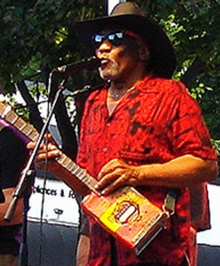Mac Arnold
Mac Arnold | |
|---|---|
 | |
| Background information | |
| Born | June 30, 1942 Ware Place South Carolina, United States[1] |
| Genres | Blues |
| Occupation | Musician |
| Instrument | Bass guitar |
| Years active | 1965–1990s, 2006-today |
| Labels | Plantation One Productions |
| Website | www |
Mac Arnold (born June 30, 1942), is an American blues musician from South Carolina.
Early years
Arnold was born in Ware Place South Carolina, one of 13 children born and raised on a sharecropper's farm.[2]
His musical journey began in the 1950s when he and his brother Leroy fashioned a guitar from a steel gas can, broomsticks, wood, nails, and screen wire. He has since become famous for the gas-can guitar and has taught many other people how to make them.[3][4]
His early career included working with a young James Brown in the band, J. Floyd & the Shamrocks. Arnold moved to Chicago in 1965, where he worked with A.C. Reed prior to joining Muddy Waters' band in 1966.[5] Arnold appears on the November 1966 live recording with Muddy released in 2009 as Muddy Waters - Authorized Bootleg.

He formed the Soul Invaders in 1967, finding work backing up B.B. King, The Temptations, and others. His studio work in the 1960s includes playing bass on several notable blues albums, including Otis Spann's The Blues Is Where It's At, and John Lee Hooker's Live At Cafe Au Go Go. He performed in various session work after moving to California in the 1970s. Arnold's distinctive bass line can be heard on the theme for the TV show Sanford and Son.
His TV work also included a four-year gig as part of the set band on Soul Train.[6]
Later years
By the 1990s, Arnold had grown weary of the road life and returned home to Pelzer, South Carolina and virtual retirement from the spotlight until 2006, when he was convinced to front his own band, Plate Full O' Blues. Arnold's return to the stage was the subject of a 2-part musical-history documentary, Stan Woodward's final film, Nothing to Prove: Mac Arnold's Return to the Blues.[7][8]
In 2013, Arnold opened his own restaurant in Greenville, South Carolina's historic West End, where he hosted his popular yearly music event, The Cornbread and Collard Greens Blues Festival.[9] [10]Despite much local success in the food business, he decided to close the restaurant in August 2017 to once again concentrate on music, especially after his nomination into the Alabama Blues Hall of Fame. [11] [12]
On September 23, 2017, Mac Arnold was inducted into the Alabama Blues Hall of Fame at the historic Dr. John R. Drish House in Tuscaloosa, Alabama.[13]
Awards and recognition
- The Blues Foundation Awards[14]
- Nominee, Best Traditional Blues Male Artist 2012. [15]
- Nominee, Best DVD 2011, Woodward Studio, Nothing to Prove, Mac Arnold. [16]
- Winner, Best Historical Album of the Year 2010, Chess - Authorized Bootleg (Muddy Waters) Mac Arnold appears on the album and accepted the award in Memphis.[17]
- Winner 2006 Folk Heritage Award [18]
- Awarded honorary doctorate of music from the University of South Carolina, May 10, 2014 [19]
- Alabama Blues Hall of Fame, inductee, 2017 [20][21]
Music in schools
Arnold and the band support the preservation of music education in public schools through the, "I Can Do Anything Foundation", an organization that was started following the release of a song by the same name, written by Mac Arnold and Max Hightower and performed by Plate full O' Blues.[22]
References
- ^ "Mac Arnold". Swampland. Retrieved 2014-07-12.
- ^ University of South Carolina, McKissick Museum Newsletter, p.3
- ^ "Mac Arnold and the Gas Can Guitar - An interview by Steve Arvey". CigarBoxGuitar.com. Retrieved 2017-06-23.
- ^ "Mac Arnold's Gas Can Guitar Heading to USC Museum". WSPA.
{{cite web}}: Unknown parameter|access date=ignored (|access-date=suggested) (help) - ^ Mark Hedin (2005-11-13). "Flash From Past Comes Back To Honor Bluesman". SFGate. Retrieved 2014-07-12.
- ^ Limnios, Michael. "Blues.gr". Retrieved 19 February 2012.
- ^ "Nothing to prove : Mac Arnold's return to the blues, a film by Stan Woodward".
- ^ "Nothing to prove : Mac Arnold's return to the blues". South Carolina Humanities.
- ^ "Mac Arnold still has the fuel for the blues, food and farming". Go Knoxville. Retrieved 2016-03-18.
- ^ "Cornbread and Collard Greens Blues Festival". WSPA. Retrieved 2017-04-24.
- ^ "Dr. Mac Arnold Says Goodbye to Restaurant Business". WSPA. Retrieved 2017-08-30.
- ^ "Greenville music icon to close restaurant; new owners plan music venue". WYFF. Retrieved 2017-08-25.
- ^ "Congratulations Mac Arnold". Macarnold.com.
- ^ "Blues Foundation Award". Blues Music Awards. The Blues Foundation. Retrieved 19 February 2012.
- ^ "2012 Blues Music Award Winners". American Blues Scene. Retrieved 2012-05-10.
- ^ "2011 Blues Music Award Nominees Announced". American Blues Scene. Retrieved 2010-12-16.
- ^ "2010 Blues Music Award winners". CommunityVoices.post-gazette.com. Retrieved 2010-05-07.
- ^ "Jean Laney Harris Folk Heritage Awards". South Carolina Arts Commission.
- ^ "Vice President Joe Biden to deliver UofSC commencement address". University of South Carolina. Retrieved 2014-04-09.
- ^ Alabama Blues Hall of Fame
- ^ Mac Arnold.com/News
- ^ "I Can Do Anything Foundation". Home Page. The I Can Do Anything Foundation. Retrieved 19 February 2012.
